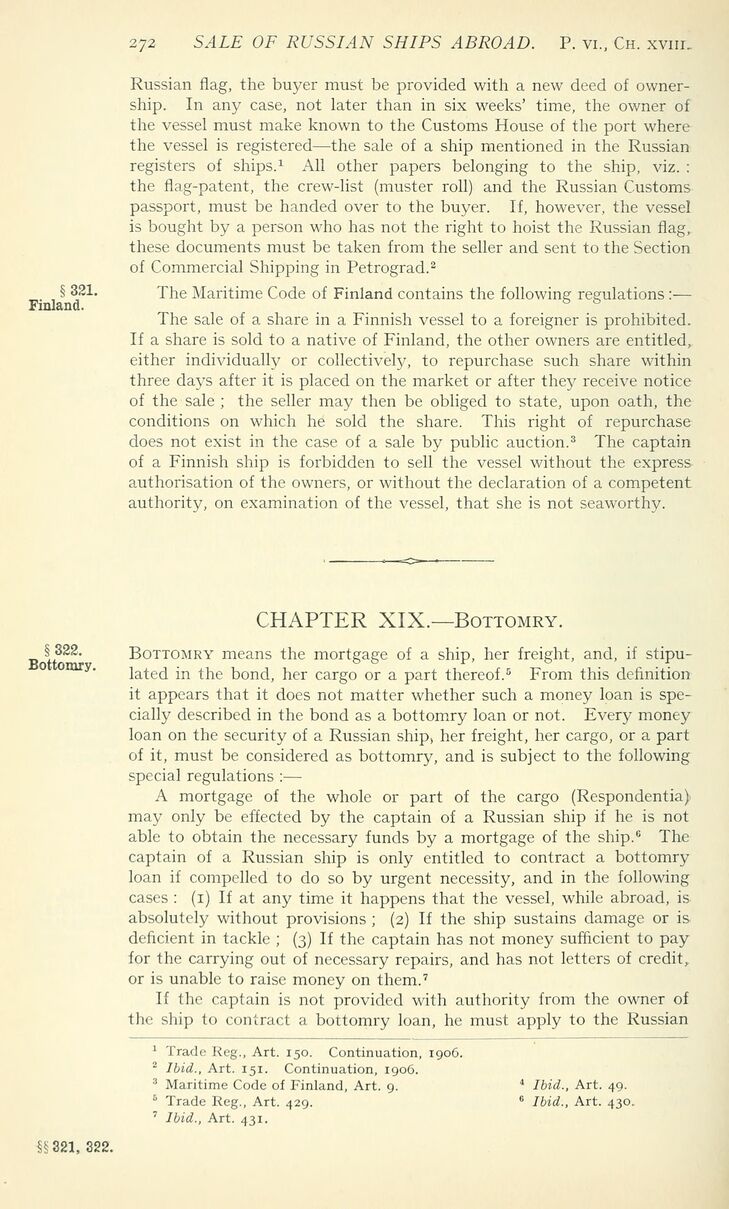
Full resolution (JPEG) - On this page / på denna sida - Pages ...

<< prev. page << föreg. sida << >> nästa sida >> next page >>
Below is the raw OCR text
from the above scanned image.
Do you see an error? Proofread the page now!
Här nedan syns maskintolkade texten från faksimilbilden ovan.
Ser du något fel? Korrekturläs sidan nu!
This page has never been proofread. / Denna sida har aldrig korrekturlästs.
272 SALE OF RUSSIAN SHIPS ABROAD. P. vi„ Сн. xvin.
Russian flag, the buyer must be provided with a new deed of
ownership. In any case, not later than in six weeks’ time, the owner of
the vessel must make known to the Customs House of the port where
the vessel is registered—the sale of a ship mentioned in the Russian
registers of ships.1 All other papers belonging to the ship, viz. :
the flag-patent, the crew-list (muster roll) and the Russian Customs
passport, must be handed over to the buyer. If, however, the vessel
is bought by a person who has not the right to hoist the Russian flag,
these documents must be taken from the seller and sent to the Section
of Commercial Shipping in Petrograd.2
The Maritime Code of Finland contains the following regulations :—
The sale of a share in a Finnish vessel to a foreigner is prohibited.
If a share is sold to a native of Finland, the other owners are entitled,
either individually or collectively, to repurchase such share within
three days after it is placed on the market or after they receive notice
of the sale ; the seller may then be obliged to state, upon oath, the
conditions on which he sold the share. This right of repurchase
does not exist in the case of a sale by public auction.3 The captain
of a Finnish ship is forbidden to sell the vessel without the express
authorisation of the owners, or without the declaration of a competent
authority, on examination of the vessel, that she is not seaworthy.
§ 322.
Bottomry.
CHAPTER XIX.—Bottomry.
Bottomry means the mortgage of a ship, her freight, and, if
stipulated in the bond, her cargo or a part thereof.5 From this definition
it appears that it does not matter whether such a money loan is
specially described in the bond as a bottomry loan or not. Every money
loan on the security of a Russian ship, her freight, her cargo, or a part
of it, must be considered as bottomry, and is subject to the following
special regulations :—
A mortgage of the whole or part of the cargo (Respondentia)
may only be effected by the captain of a Russian ship if he is not
able to obtain the necessary funds by a mortgage of the ship.6 The
captain of a Russian ship is only entitled to contract a bottomry
loan if compelled to do so by urgent necessity, and in the following
cases : (i) If at any time it happens that the vessel, while abroad, is
absolutely without provisions ; (2) If the ship sustains damage or is
deficient in tackle ; (3) If the captain has not money sufficient to pay
for the carrying out of necessary repairs, and has not letters of credit,
or is unable to raise money on them.7
If the captain is not provided with authority from the owner of
the ship to contract a bottomry loan, he must apply to the Russian
1 Trade Reg., Art. 150. Continuation, 1906.
2 Ibid., Art. 151. Continuation, 1906.
3 Maritime Code of Finland, Art. 9. 4 Ibid., Art. 49.
6 Trade Reg., Art. 429. 0 Ibid., Art. 430.
7 Ibid., Art. 431.
§§321, 322.
§321.
Finland.
<< prev. page << föreg. sida << >> nästa sida >> next page >>